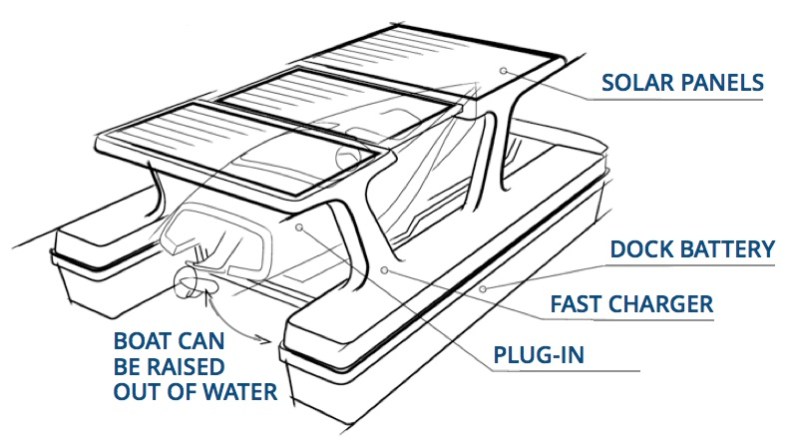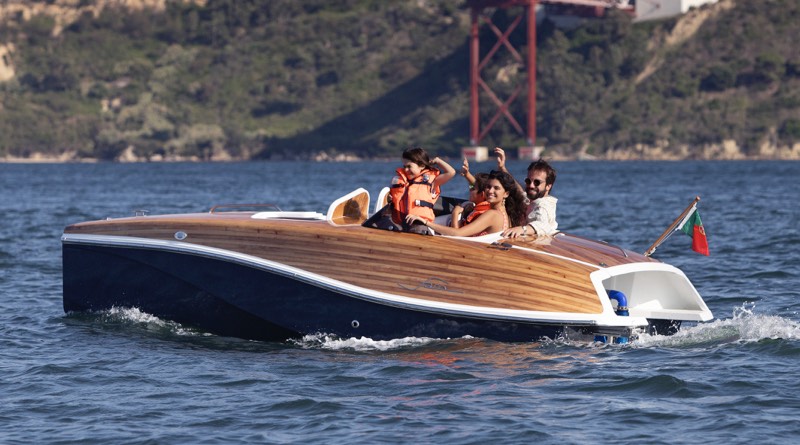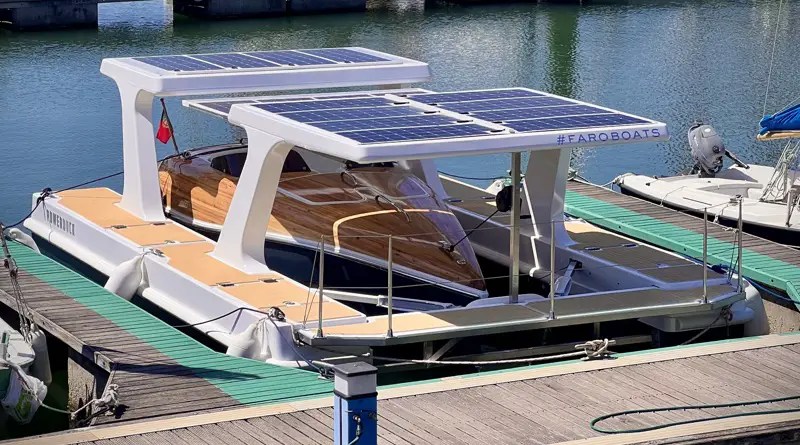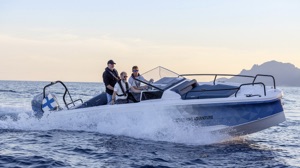Powerdock solar boat dock charges e-boats in 3 hours
Faroboats, winner of the 2022 Gussies Electric Boat Awards in the Under 8m category, has unveiled a new concept, the Powerdock: a movable dock/boat port with solar panels that can house and charge any electric boat using the energy of the sun.
The solar boat dock can be a permanent fixture at a private lake house/cottage/summer home, but is also towable and has been designed and sized to fit any single berth at any standard dock or marina anywhere in the world.
Three models – 10, 20, 30 kWh batteries
The Powerdock comes in three models – the S10, S20 and S30 – that have battery capacities of 10.2 kWh, 20.4 kWh and 30.6 kWh respectively. On the roof of each are four 450 watt solar arrays of four panels each (16 panels) that make up a combined output of 2.7 kiloWatts peak. (Editor’s Note: kiloWatts peak (kWp) is the amount of energy produced under standard laboratory test conditions, which are basically equivalent to bright sunshine. A 2.7 kW peak system can produce 2.7 kilowatt-hours of energy in one hour under ideal conditions.)
In practical terms, what that means is that 8 hours of sunshine will charge the Powerdock S10’s battery to 75-100% of of capacity in 6 to 8 hours and the S30 battery in 13-18 hours. The battery pack of the Powerdock is used to charge the battery pack of the electric boat in its berth.

The system can work with any boat, but maybe the best illustration of charging capabilities is with the company’s own boats. The 5 metre (16.4 ft) Faro 5 can be outfitted with any of three systems: Torqeedo Cruise 6.0 with 2 X 5kWh (10 kWh) batteries, RIM Drive Technologies 11 or 15 kW motor with 2 X 9.6 kWh batteries (19.2 kWh) or the Huracan 30 with a 25kWh battery pack.
The boat batteries and Powerdock models have been matched up with each so that it takes less than 3 hours to transfer the electricity from the dock to the appropriate boat: The S10 to the Torqeedo setup, the S20 to the RIM Drive Technologies setup and the S30 to the Huracan setup.
Solar boat dock can also use wind turbines
The Powerdock can also accommodate wind turbines to charge its batteries in conjunction with the solar array, and the company is offering different and customized versions for any electric or hybrid boat up to 12m.
See Faro5 and all winners of the 2022 Gussies Electric Boat Awards
Faroboats was launched in Portugal 2020 with a mission to “bring self-renewable boating solutions to the world.” Their first model, the Faro5, is a sleek, hand crafted 5-passenger leisure boat that evokes the classic styling of a century ago and adheres to their principals of sustainability in all ways. It is made with FSC-certified, sustainably forested Cryptomeria japonica (Japanese Cedar) wood from the Portuguese Azores islands.

From the beginning the idea was to make boating truly sustainable by pairing the Faro 5 with a charging solution that operates totally on renewable energy. Hence, the Powerdock.
It was unveiled at a live event in Lisbon, a few hundred metres from the ‘Padrão dos Descobrimentos‘ monument that celebrates the world-changing Portuguese navigators of the 15th and 16th centuries.
‘A glimpse of the future’
“We’re here to give you a glimpse of the future,’ announced Faroboats CEO Nuno Frazão. ‘A self-sustainable future that is independent of infrastructure, of economic shifts and conflicts, a future that does not waste, does not pollute, does not infringe on others or the planet. A statement of self-sufficiency.”
With that the Powerdock was revealed and the guests were treated to live demonstrations as well as sea trials of two Faro 5 models.
Tomás Costa Lima, the Naval Designer that created the Powerdock and the Faro5 line, could not contain his emotions: “It has been 4 years of inspiration, hard work, and overcoming the kind of challenges you only face when you’re building something that does not exist yet, from the drawing board to the shipyard. But looking at the expressions of our guests and feeling their excitement makes it all worthwhile, and we’re ready for the next steps in our innovation ladder.”
Faroboats and the Powerdock are represented in 15 countries across 5 continents. More information about pricing and models can be found on the Faroboats website.



This sentence:
“A 2.7 kWh peak system can produce 2.7 kilowatts of power in one hour under ideal conditions.”
should be:
“A 2.7 kW peak system can produce 2.7 kilowatt-hours of energy in one hour under ideal conditions.”
You have the terms “kW” (power) and “kWh” (energy) reversed, both in the above sentence and in the preceding sentences.
Ouch! Thank you!!